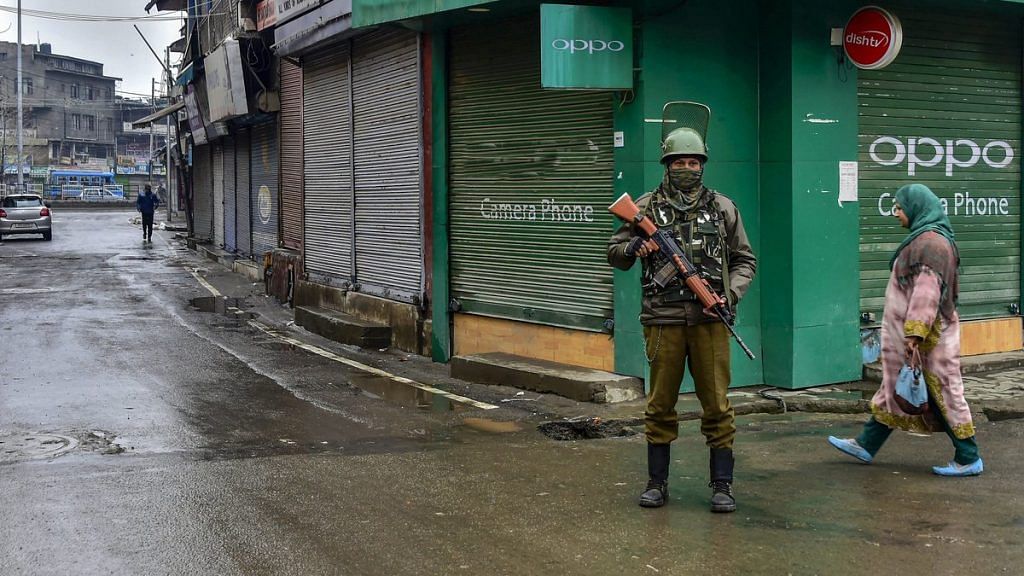New Delhi: Protracted exposure to violence has led to a formidable mental health crisis in Kashmir, according to The Lancet, one of the world’s oldest and most prestigious medical journals.
In its issue dated 17 August, the journal has carried an editorial commentary on India’s move to scrap Article 370, titled ‘Fear and uncertainty around Kashmir’s future’. It says: “Prime Minister Narendra Modi vows that his decision to revoke autonomy will bring prosperity to Kashmir. But first, the people of Kashmir need healing from the deep wounds of this decades-old conflict, not subjugation to further violence and alienation.”
The Lancet has used a study by Médecins Sans Frontières (MSF), a Geneva-headquartered international non-government medical organisation, which highlighted “that nearly half of Kashmiris rarely felt safe and of those who had lost a family member to violence, one in five had witnessed the death first-hand.” The study was conducted in two rural districts affected by conflict.
“Therefore, it is unsurprising that people in the region have increased anxiety, depression, and post-traumatic stress disorder,” it says.
However, on page 542 of the same issue, an editorial has praised the health parameters of Kashmir, saying: “Despite decades of instability, developmental indicators suggest that Kashmir is doing well compared with the rest of India.
“In 2016, life expectancy was 68.3 years for men and 71.8 years for women, which are greater than the respective national averages.”
‘Controversial’ move
The Lancet has termed India’s move to revoke the autonomous status of J&K as “controversial”. “The announcement fanned tension with Pakistan, which also claims the region and has fought India over it for more than seven decades,” it said.
“At least 28,000 Indian security forces have been deployed; in the capital city Srinagar, a lockdown has been implemented that suspended communication and internet links and a strict curfew have been imposed.”
The commentary claims that the huge “militant presence raises serious concerns for the health, safety, and freedoms of the Kashmiri people”. It further says: “Since the insurgency of Kashmir in 1989, the state has experienced bloody conflict from both sides, resulting in more than 50,000 deaths.”
Using another report by the UN High Commissioner for Human Rights, which was published last month, the commentary said: “Gross human rights violations by state security forces and armed groups have occurred, including cross-border firings, sexual violence, enforced disappearances, and acts of terrorism.”
Also read: The constitutional questions that arise from the end of Jammu and Kashmir as a state
Social media users call report ‘biased’
The Lancet has received backlash from Indians on Twitter, who have called it “political commentary rather than medical commentary — which is its core area of expertise”.
Fear and uncertainty around Kashmir's future https://t.co/G7042TtqUl
Perhaps the Lancet should focus on medicine and health and not concern itself with politics. Even better: why not call out Britain-occupied northern Ireland?— Jaysri (@Jaysri45538703) August 17, 2019
What on earth does a Medical Journal/Magazine @TheLancet have to do with @Kashmir politics..? Is it also funded/bought by #Chrislamoliberal terrorists?@AmitShah @DrSJaishankar @drharshvardhan @Sanjay_Dixit @sanjeevsanyal @madhukishwar @ARanganathan72 @ShefVaidya @RatanSharda55 pic.twitter.com/Z9EPjxKtEo
— Swami Nishchalanand ?? (@Swamijitweets) August 17, 2019
Some users have been calling the article “biased”, while others have called for a “boycott”.
@TheLancet The Lancet has published a highly biased one sided editorial on the future of Kashmir. The (cont) https://t.co/cfMbZlkole
— Karthik Balachandran (@karthik2k2) August 17, 2019
We all from India should boycott The Lancet .
It's very shameful a publisher house of medical journal is doing politics on Kashmir.
All Indian doctors in any country must boycott Lanct— Suresh Maurya (@maurya811) August 17, 2019
Also read: Kashmiris did hear Modi’s speech – no DTH or radio channel was shut in Jammu and Kashmir
